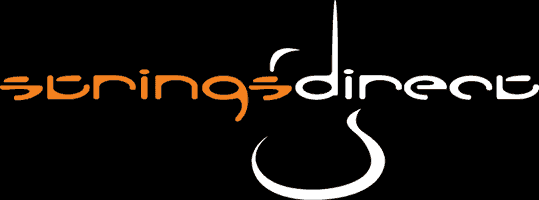John Paul Jones
By Strings Direct – 29 August, 2023
PLAYER SPOTLIGHT
"The wisest guy in Led Zeppelin was John Paul Jones. Why? He never got caught in an embarrassing situation."
Benoit Gautier, of Atlantic Records.


The focus of this edition sees us begin our journey in Sidcup, Kent. The year 1946 saw the birth of one of the U.K.'s most prolific and highly decorated musicians...
Mr. John Paul Jones
“Widely regarded as one of the most influential bassists of all time for his work with Led Zeppelin, Jones is a masterful multi-instrumentalist and appears on dozens of artists’ records, with his work ranging from playing on Donovan’s ‘Sunshine Superman’ to writing the string arrangements for R.E.M’s Automatic For The People.
Over his long career, Jones has been at the forefront of several new movements in music, with his arsenal of gear playing an important role in creating different musical textures.”
Will Brewster - Mixdownmag
A multi-instrumentalist, composer, arranger, and all-round inspirational character, John Paul Jones is so much more than just an iconic player; he's more of a fundamental part of British musical history and a master of contemporary music that we've all come to know and love. He is the discrete soundtrack to our lives.

The Age Of The 60’s Sessions…
Born into a strong musical heritage, John Paul Jones was surrounded by nothing but musical influence from day one. Playing the piano from the age of 6 to a good standard, he was taught by his father Joe. His father was in fact a professional pianist and arranger for big bands throughout the 1940s and 50s.
John's mother was also a musician and due to the touring commitments and unsociable hours of a working musician partnership, he was sent to boarding school throughout his formative years.
“I had a very strange life because my parents were on the road all the time and I didn’t see a lot of them; I was at boarding school very, very young. Then I joined them on the stage in variety so my life didn’t fit in with anyone I knew, which was why I was very quiet and didn’t have too many friends because I knew I wasn’t going to see them again.”
“My father had a musical comedy act with my mother, and I saw them on a bill with Ronnie Aldrich And The Squadronaires, which Pete Townshend’s dad was in – I can picture the gig. Life was different for us. People would ask where you went on your holidays; they’d got to one seaside town – I went to eight: one a week!”
John Paul Jones Interview By Rafael Polcaro
While in attendance at the boarding school, John Paul Jones studied music formally and by the age of 14 he was the registered choirmaster and organist at the associated church. At this age John experienced a key moment when he truly found his next instrument for the duration of his now extensive career.
I believe every musician at one stage or another has a significant moment. For John Paul Jones it was hearing this particular track. From then on, he had a fixation on owning a bass guitar:
This is an incredibly groovy and funky track which features the exquisite playing of Phil Upchurch along with a very masterful bass solo... a moment of inspiration and clarity for John Paul Jones.
Upon consulting his father on his desire to take up the bass guitar his response was very disregarding and very much one-sided in his beliefs.
“Son don't take up the bass guitar it's a novelty instrument. In two years time nobody will ever have heard of one, take up the saxophone you always have work with the saxophone”
John Paul Jones - Elixir Interview Part 1
After much persuasion John eventually got his first bass at 14 and worked as the local church organist to fund the instrument which was a 'Dallas Tuxedo'.
After a number of part exchanges, he eventually ended up on what is now his iconic and signature instrument... a 1962 Fender Jazz bass.
This guitar is deemed as John's number one instrument and has played a key part in his career both in his session work and throughout the glory years of Led Zeppelin.

“Bought for $250 to keep up with his heavy load of work as a session musician, Jones’s sunburst Jazz Bass was his main axe for his work with Led Zeppelin.
Jones used this bass on almost every Led Zeppelin track live and in the studio up until 1975, where he had to retire the instrument due to issues with the action and electronics.
Later on, JPJ would revive his love affair with the Jazz Bass for his work in the studio with 'Them Crooked Vultures', and would occasionally bring it out for live appearances. He’s also been spotted playing a Fiesta Red finished model, as well as an incredible early example of a Fender Precision Bass with the supergroup.”
John Paul Jones overview - https://mixdownmag.com.au/features/gear-rundown-john-paul-jones/
Jones soon went on to become a prolific session player throughout the 60s. His work portfolio is astounding and just like many of the players back then, you can hear his playing on so many top ranking hits - too many to mention!
The next level in his career came in 1962 when he was hired by Jet Harris and Tony Meehan of The Shadows.
This was a very successful two-year working relationship within the band and formulated a great experience.
Eventually Jones would move on from this and a long-term replacement would be agreed upon to fulfil the future commitments with The Shadows.

https://www.johnpauljones.com/bio/
Here is an incredible point in history where many session players who have previously passed each other on the circuit now come together to create something unforgettable beyond everybody's wildest imaginations... even to this day!
Led Zeppelin

Now I'm sure we are all familiar with this iconic band. For me and many other people they were a revolutionary contribution to musical history and have heroic status.
It's obvious to see the impact of the two front men. Robert Plant's soaring vocals and Jimmy Page’s flamboyant guitar playing and style. Led Zeppelin is "in your face rock 'n' roll". Borderline early inventions of heavy metal mixed with a good dose of psychedelia.
“Not only is Jones the co-founder of Led Zeppelin, but while most people don’t know it, he was the real driving force behind the band’s best years. His bass playing is what really gave body to the songs and what TRULY made John Bonham’s drum parts shine the way they did. Just listen to this one short, yet iconic song by the band for proof…"
Take A Listen At The 1:08 Part Of “Ramble On”:
https://rockmusicrevival.com/2018/12/27/john-paul-jones-3-reasons-i-think-hes-the-most-under-appreciated-member-of-led-zeppelin/
What John Paul Jones bought to Led Zeppelin in many peoples' opinion is the depth of overall genre diversity and multi-instrumentation.
Jones can comfortably move from bass guitar to piano, organ or any keys-based instrument along with mandolin and standard six string guitar - just to name but a few of his many talents.
He was dedicated to make the band sound the best it possibly could through putting his musical stamp on every recording and live performance.
His impact was reserved but fundamentally important to the overall stability and structure of the Led Zeppelin soundscape.
One of the truly incredible things to appreciate about Led Zeppelin is the fundamental relationship and communication between John Paul Jones, his bass parts and John Bonham's landmark drumming.

“I’d played with good drummers before, but I realised Bonzo was a killer drummer from the word go. It was a lot of fun playing with someone so shit-hot with such great musicality; he knew what he was doing – big time. Jimmy definitely had a vision of how things should be, and we played our part but brought our own stuff to it.”
https://rockmusicrevival.com/2018/12/27/john-paul-jones-3-reasons-i-think-hes-the-most-under-appreciated-member-of-led-zeppelin/
This incredible video by the amazing guys at Reverb.com really takes a part some Jones' finest moments and you can really appreciate the fluidity and complexities of his playing style.
String Sessions
Such a historical and coveted musician has of course been cross-examined many times by fascinated fans and musicians alike.
Players of this status and historical significance are always heavily looked into to help understand just how they got their signature sound.
It's been debated back-and-forth about what John Paul Jones used, with much discussion surrounding Rotosound along with La Bella.
But the investigations always lead to flatwound being the choice of construction and people have tried to identify the strings based upon the colours of the strings' silk wraps.
The fact that this was so long ago makes it difficult to decipher what was being used at the time (and simply what was available at the time) especially if the tech crew had to replenish string supplies mid tour.
Led Zeppelin did some enormous tours of course over extended periods of time so this would've been highly likely.
As discussed in the following link, it appears that his string choice has been consistent throughout his career;
https://www.talkbass.com/threads/john-paul-jones-strings.1207017/
ROTOSOUND RS77LD 4-String Jazz Bass Monel Flatwound 45-105 Long Scale Bass Guitar Strings

This speculative detail is mostly confirmed but also contradicted here when John Paul Jones was interviewed by Vintage Guitars magazine back in 2002.
“How are your basses set up?
"The action is quite low – just above rattle point. I still play them quite hard, but then I don’t mind if they’re rattling. That’s all part of it… or part of me, anyway."
Do you have a preference for your brand and gauge of bass strings?
"Yes. I use Rotosound Swing Bass strings for everything. For the multi-string basses, I use the Rotosound Piano Bass strings, with the exposed centre core, because they’d be too far apart if I were to use regular bass strings. I prefer Rotosound bass strings, but I was never that particular about string gauges. The gauge doesn’t really matter to me.”
John Paul Jones for Vintage Guitars magazine August 2002. By Lisa Sharken
So here John Paul Jones clearly confirms he selects the Swing Bass strings but this was in 2002 of course it may have been the flatwound choice back in the Zeppelin days.
More recently we find John featured with the premium string brand Elixir.
In the following video he really documents what the symbolic relationship means and how it relates to the player converting idea to music.
You would think that Jones being such a technical and gifted musician his theory on string choice and string construction would be very scientific, technical and detailed but it's actually more of a spiritual approach which is very interesting.
John Paul Jones - Elixir Interview Part 2
“The strings are the link between you and Guitars the instrument, I came to Elixir through Chris Thile.
I find that the strings don't get in the way of the creative process on less thing to think about, I can move freely and slide up and down without friction they feel great”

So we discover what an up-to-date John Paul Jones in the modern day is using what we see as modern technology in the string world and he finds that they really work from him across all instruments. It's just a further complimentary characteristic of John as a player and musician.
He is a very functional and practical player and always seems to be open to ideas that will make things work and not be stuck to the ideal that he needs certain things or certain ideals to make things right.
References
http://www.prog-sphere.com/specials/led-zeppelin-film-soundtracks/






